Editor's note: Sung-Yoon Lee is the Kim Koo-Korea Foundation professor in Korean Studies and assistant professor at the Fletcher School of Law and Diplomacy at Tufts University.
(CNN) -- Dennis Rodman, the former NBA star and the first American known to have met North Korean leader Kim Jong Un, is in the secretive country again, purportedly to meet his "friend Kim, the Marshal." And also, to negotiate for the release of Kenneth Bae, a U.S. citizen detained since November.
Rodman's second trip to North Korea this year comes months after months of threats of nuclear annihilation from Pyongyang. His desire to help Bae is likely to be registered in the annals of diplomatic history as little more than a little diverting adventure.
But one never knows. The "Marshal," who has actually never served in the military, might choose to act in a statesmanlike manner and release Bae after another high-spirited soiree with the basketball legend. That would be good news for Bae, who is reportedly in poor health.
Other detained Americans
.cnnArticleGalleryNav{border:1px solid #000;cursor:pointer;float:left;height:25px;text-align:center;width:25px} .cnnArticleGalleryNavOn{background-color:#C03;border:1px solid #000;float:left;height:25px;text-align:center;width:20px} .cnnArticleGalleryNavDisabled{background-color:#222;border:1px solid #000;color:#666;float:left;height:25px;text-align:center;width:25px} .cnnArticleExpandableTarget{background-color:#000;display:none;position:absolute} .cnnArticlePhotoContainer{height:122px;width:214px} .cnnArticleBoxImage{cursor:pointer;height:122px;padding-top:0;width:214px} .cnnArticleGalleryCaptionControl{background-color:#000;color:#FFF} .cnnArticleGalleryCaptionControlText{cursor:pointer;float:right;font-size:10px;padding:3px 10px 3px 3px} .cnnArticleGalleryPhotoContainer cite{background:none repeat scroll 0 0 #000;bottom:48px;color:#FFF;height:auto;left:420px;opacity:.7;position:absolute;width:200px;padding:10px} .cnnArticleGalleryClose{background-color:#fff;display:block;text-align:right} .cnnArticleGalleryCloseButton{cursor:pointer} .cnnArticleGalleryNavPrevNext span{background-color:#444;color:#CCC;cursor:pointer;float:left;height:23px;text-align:center;width:26px;padding:4px 0 0} .cnnArticleGalleryNavPrevNextDisabled span{background-color:#444;color:#666;float:left;height:23px;text-align:center;width:25px;padding:4px 0 0} .cnnVerticalGalleryPhoto{padding-right:68px;width:270px;margin:0 auto} .cnnGalleryContainer{float:left;clear:left;margin:0 0 20px;padding:0 0 0 10px}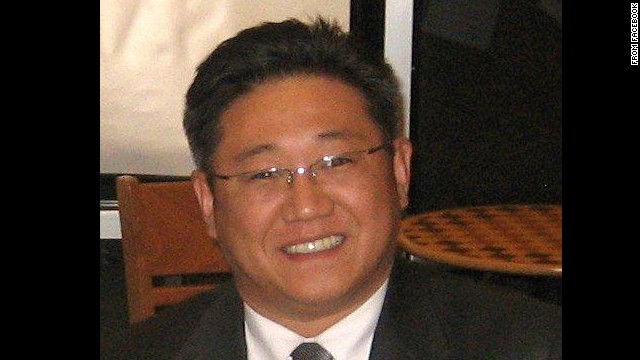 A North Korean court has sentenced Kenneth Bae, a U.S. citizen, to 15 years of hard labor for committing "hostile acts" against the state. Those alleged acts were not detailed by the country's state-run news agency when it announced the sentence Thursday, May 2. Bae, here in a photo from a Facebook page titled Remember Ken Bae, was arrested in November. "This was somebody who was a tour operator, who has been there in the past and has a visa to go to the North," a senior U.S. official told CNN. Mexican authorities arrested Yanira Maldonado, a U.S. citizen, right, on May 22, for alleged drug possession. She and her husband, Gary, were traveling from Mexico back to the United States when their bus was stopped and searched. She was released on Friday, May 31 and is back in the U.S. North Korea has arrested Americans before, only to release them after a visit by a prominent dignitary. Journalists Laura Ling, center, and Euna Lee, to her right, spent 140 days in captivity after being charged with illegal entry to conduct a smear campaign. They were freed in 2009 after a trip by former President Bill Clinton. Former President Jimmy Carter negotiated the release of Aijalon Gomes, who was detained in 2010 after crossing into North Korea illegally from China. Analysts say high-level visits give Pyongyang a propaganda boost and a way to save face when it releases a prisoner. Eddie Yong Su Jun was released by North Korea a month after he was detained in April 2011. His alleged crime was not provided to the media. The American delegation that secured his freedom included Robert King, the U.S. special envoy for North Korean human rights issues. Robert Park was released by North Korea in 2010 without any apparent U.S. intervention. The Christian missionary crossed into North Korea from China, carrying a letter asking Kim Jong Il to free political prisoners and resign. North Korea's state-run news agency said Park was released after an "admission and sincere repentance of his wrongdoings." Here, Park holds a photo of Kim and a malnourished child during a protest in Seoul. Josh Fattal, center, Shane Bauer and Sarah Shourd were detained by Iran while hiking near the Iraq-Iran border in July 2009. Iran charged them with illegal entry and espionage. Shourd was released on bail for medical reasons in September 2010; she never returned to face her charges. Bauer and Fattal were convicted in August 2011, but the next month they were released on bail and had their sentences commuted. An Iranian court threw out a death penalty conviction last year for Amir Hekmati, a former U.S. Marine charged with spying. But he still remains in solitary confinement at Iran's notorious Evin Prison. Hekmati was detained in August 2011 during a visit to see his grandmother; his family and the Obama administration deny accusations that he was spying for the CIA. Haleh Esfandiari, an Iranian-American scholar, was also detained at Evin Prison, spending months in solitary confinement before Iran released her on bail in August 2007. Esfandiari was visiting her ailing mother in Tehran when she was arrested and charged with harming Iran's national security. Alan Gross, at right with Rabbi Arthur Schneier, has been in Cuban custody since December 2009, when he was jailed while working as a subcontractor. Cuban authorities say Gross tried to set up illegal Internet connections on the island. Gross says he was just trying to help connect the Jewish community to the Internet. Former President Jimmy Carter and New Mexico Gov. Bill Richardson have both traveled to Cuba on Gross' behalf, but they were unable to secure his release. Sixteen Americans were among the dozens arrested in December 2011 when Egypt raided the offices of 10 nongovernmental organizations that it said received illegal foreign financing and were operating without a public license. Many of the employees posted bail and left the country after a travel ban was lifted a few months later. Robert Becker, right, chose to stay and stand trial. Freelance reporter James Foley went missing in November after his car was stopped by gunmen in Syria. He is likely being held by the Syrian government, according to the GlobalPost, an online international news outlet to which he contributed, and Foley's brother. Filmmaker Timothy Tracy was arrested in Venezuela in April on allegations of funding opponents of newly elected President Nicolas Maduro, successor to the late Hugo Chavez. Tracy went to Venezuela to make a documentary about the political division gripping the country. Retired FBI agent Robert Levinson has been missing since 2007. His family says he was working as a private investigator in Iran when he disappeared. It's believed Levinson, now 64, is being held captive somewhere in southwest Asia. Americans detained abroad Americans detained abroad Americans detained abroad Americans detained abroad Americans detained abroad Americans detained abroad Americans detained abroad Americans detained abroad Americans detained abroad Americans detained abroad Americans detained abroad Americans detained abroad Americans detained abroad Americans detained abroad HIDE CAPTION << <
A North Korean court has sentenced Kenneth Bae, a U.S. citizen, to 15 years of hard labor for committing "hostile acts" against the state. Those alleged acts were not detailed by the country's state-run news agency when it announced the sentence Thursday, May 2. Bae, here in a photo from a Facebook page titled Remember Ken Bae, was arrested in November. "This was somebody who was a tour operator, who has been there in the past and has a visa to go to the North," a senior U.S. official told CNN. Mexican authorities arrested Yanira Maldonado, a U.S. citizen, right, on May 22, for alleged drug possession. She and her husband, Gary, were traveling from Mexico back to the United States when their bus was stopped and searched. She was released on Friday, May 31 and is back in the U.S. North Korea has arrested Americans before, only to release them after a visit by a prominent dignitary. Journalists Laura Ling, center, and Euna Lee, to her right, spent 140 days in captivity after being charged with illegal entry to conduct a smear campaign. They were freed in 2009 after a trip by former President Bill Clinton. Former President Jimmy Carter negotiated the release of Aijalon Gomes, who was detained in 2010 after crossing into North Korea illegally from China. Analysts say high-level visits give Pyongyang a propaganda boost and a way to save face when it releases a prisoner. Eddie Yong Su Jun was released by North Korea a month after he was detained in April 2011. His alleged crime was not provided to the media. The American delegation that secured his freedom included Robert King, the U.S. special envoy for North Korean human rights issues. Robert Park was released by North Korea in 2010 without any apparent U.S. intervention. The Christian missionary crossed into North Korea from China, carrying a letter asking Kim Jong Il to free political prisoners and resign. North Korea's state-run news agency said Park was released after an "admission and sincere repentance of his wrongdoings." Here, Park holds a photo of Kim and a malnourished child during a protest in Seoul. Josh Fattal, center, Shane Bauer and Sarah Shourd were detained by Iran while hiking near the Iraq-Iran border in July 2009. Iran charged them with illegal entry and espionage. Shourd was released on bail for medical reasons in September 2010; she never returned to face her charges. Bauer and Fattal were convicted in August 2011, but the next month they were released on bail and had their sentences commuted. An Iranian court threw out a death penalty conviction last year for Amir Hekmati, a former U.S. Marine charged with spying. But he still remains in solitary confinement at Iran's notorious Evin Prison. Hekmati was detained in August 2011 during a visit to see his grandmother; his family and the Obama administration deny accusations that he was spying for the CIA. Haleh Esfandiari, an Iranian-American scholar, was also detained at Evin Prison, spending months in solitary confinement before Iran released her on bail in August 2007. Esfandiari was visiting her ailing mother in Tehran when she was arrested and charged with harming Iran's national security. Alan Gross, at right with Rabbi Arthur Schneier, has been in Cuban custody since December 2009, when he was jailed while working as a subcontractor. Cuban authorities say Gross tried to set up illegal Internet connections on the island. Gross says he was just trying to help connect the Jewish community to the Internet. Former President Jimmy Carter and New Mexico Gov. Bill Richardson have both traveled to Cuba on Gross' behalf, but they were unable to secure his release. Sixteen Americans were among the dozens arrested in December 2011 when Egypt raided the offices of 10 nongovernmental organizations that it said received illegal foreign financing and were operating without a public license. Many of the employees posted bail and left the country after a travel ban was lifted a few months later. Robert Becker, right, chose to stay and stand trial. Freelance reporter James Foley went missing in November after his car was stopped by gunmen in Syria. He is likely being held by the Syrian government, according to the GlobalPost, an online international news outlet to which he contributed, and Foley's brother. Filmmaker Timothy Tracy was arrested in Venezuela in April on allegations of funding opponents of newly elected President Nicolas Maduro, successor to the late Hugo Chavez. Tracy went to Venezuela to make a documentary about the political division gripping the country. Retired FBI agent Robert Levinson has been missing since 2007. His family says he was working as a private investigator in Iran when he disappeared. It's believed Levinson, now 64, is being held captive somewhere in southwest Asia. Americans detained abroad Americans detained abroad Americans detained abroad Americans detained abroad Americans detained abroad Americans detained abroad Americans detained abroad Americans detained abroad Americans detained abroad Americans detained abroad Americans detained abroad Americans detained abroad Americans detained abroad Americans detained abroad HIDE CAPTION << <  1
1  2
2  3
3  4
4  5
5  6
6  7
7  8
8  9
9  10
10  11
11  12
12  13
13  14 > >>
14 > >>  Americans detained abroad .cnnArticleGalleryNav{border:1px solid #000;cursor:pointer;float:left;height:25px;text-align:center;width:25px} .cnnArticleGalleryNavOn{background-color:#C03;border:1px solid #000;float:left;height:25px;text-align:center;width:20px} .cnnArticleGalleryNavDisabled{background-color:#222;border:1px solid #000;color:#666;float:left;height:25px;text-align:center;width:25px} .cnnArticleExpandableTarget{background-color:#000;display:none;position:absolute} .cnnArticlePhotoContainer{height:122px;width:214px} .cnnArticleBoxImage{cursor:pointer;height:122px;padding-top:0;width:214px} .cnnArticleGalleryCaptionControl{background-color:#000;color:#FFF} .cnnArticleGalleryCaptionControlText{cursor:pointer;float:right;font-size:10px;padding:3px 10px 3px 3px} .cnnArticleGalleryPhotoContainer cite{background:none repeat scroll 0 0 #000;bottom:48px;color:#FFF;height:auto;left:420px;opacity:.7;position:absolute;width:200px;padding:10px} .cnnArticleGalleryClose{background-color:#fff;display:block;text-align:right} .cnnArticleGalleryCloseButton{cursor:pointer} .cnnArticleGalleryNavPrevNext span{background-color:#444;color:#CCC;cursor:pointer;float:left;height:23px;text-align:center;width:26px;padding:4px 0 0} .cnnArticleGalleryNavPrevNextDisabled span{background-color:#444;color:#666;float:left;height:23px;text-align:center;width:25px;padding:4px 0 0} .cnnVerticalGalleryPhoto{padding-right:68px;width:270px;margin:0 auto} .cnnGalleryContainer{float:left;clear:left;margin:0 0 20px;padding:0 0 0 10px}
Americans detained abroad .cnnArticleGalleryNav{border:1px solid #000;cursor:pointer;float:left;height:25px;text-align:center;width:25px} .cnnArticleGalleryNavOn{background-color:#C03;border:1px solid #000;float:left;height:25px;text-align:center;width:20px} .cnnArticleGalleryNavDisabled{background-color:#222;border:1px solid #000;color:#666;float:left;height:25px;text-align:center;width:25px} .cnnArticleExpandableTarget{background-color:#000;display:none;position:absolute} .cnnArticlePhotoContainer{height:122px;width:214px} .cnnArticleBoxImage{cursor:pointer;height:122px;padding-top:0;width:214px} .cnnArticleGalleryCaptionControl{background-color:#000;color:#FFF} .cnnArticleGalleryCaptionControlText{cursor:pointer;float:right;font-size:10px;padding:3px 10px 3px 3px} .cnnArticleGalleryPhotoContainer cite{background:none repeat scroll 0 0 #000;bottom:48px;color:#FFF;height:auto;left:420px;opacity:.7;position:absolute;width:200px;padding:10px} .cnnArticleGalleryClose{background-color:#fff;display:block;text-align:right} .cnnArticleGalleryCloseButton{cursor:pointer} .cnnArticleGalleryNavPrevNext span{background-color:#444;color:#CCC;cursor:pointer;float:left;height:23px;text-align:center;width:26px;padding:4px 0 0} .cnnArticleGalleryNavPrevNextDisabled span{background-color:#444;color:#666;float:left;height:23px;text-align:center;width:25px;padding:4px 0 0} .cnnVerticalGalleryPhoto{padding-right:68px;width:270px;margin:0 auto} .cnnGalleryContainer{float:left;clear:left;margin:0 0 20px;padding:0 0 0 10px} 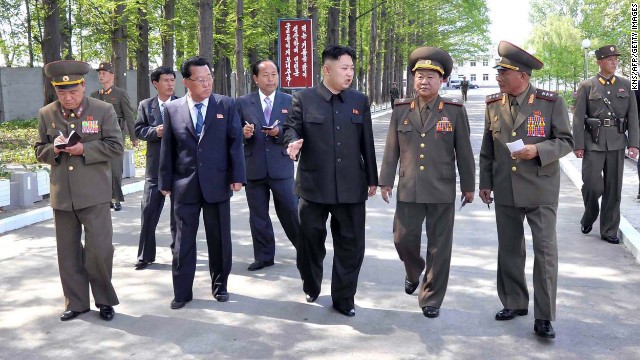 North Korean leader Kim Jong Un inspects a military factory in this undated picture released by the Korean Central News Agency on Friday, May 17. North Korea launched several short-range guided missiles into the sea off the Korean Peninsula's east coast May 18, South Korea's semi-official news agency Yonhap cited the South Korean Defense Ministry as saying. Kim Jong Un visits the Ministry of People's Security on Wednesday, May 1, as part of the country's May Day celebrations. A North Korea soldier gestures to stop photographers from taking photos from a Chinese tour boat as other soldiers look on along the North Korean bank of the Yalu River near the town of Sinuiji across the Chinese city of Dandong in Liaoning province, China, on Saturday, April 6. North Korean soldiers gather by the docks in Sinuiju near the Chinese border on Thursday, April 4. North Korean soldiers patrol along the Yalu River in Sinuiju across the border from the Chinese city of Dandong on April 4. Kim Jong Un is briefed by his generals in this undated photo. On the wall is a map titled "Plan for the strategic forces to target mainland U.S." Kim Jong Un works during a briefing in this undated photo. North Korean leader Kim Jong Un inspects drills by the Korean People's Army navy at an undisclosed location on North Korea's east coast on March 25 in a photo from the state-run Korean Central News Agency. Kim makes his way to an observation post with North Korean soldiers on March 25. Kim uses a pair of binoculars to look south from the Jangjae Islet Defense Detachment near South Korea's Taeyonphyong Island on March 7. Kim is greeted by the family of a soldier as he inspects Jangjae Islet Defense Detachment near South Korea's Taeyonphyong Island in South Hwanghae province on Thursday, March 7, in a photo from the state-run Korean Central News Agency. Kim is surrounded by soldiers during a visit to the Mu Islet Hero Defense Detachment near South Korea's Taeyonphyong Island on March 7. North Korea has escalated its bellicose rhetoric, threatening nuclear strikes, just before the U.N. Security Council passed tougher sanctions against the secretive nation on March 7. Kim arrives at Jangjae Islet by boat to meet with soldiers of the Jangjae Islet Defense Detachment near Taeyonphyong Island in South Hwanghae province on March 7. Soldiers in the North Korean army train at an undisclosed location on March 6. North Korean leader Kim Jong Un, center, poses with chiefs of branch social security stations in this undated picture released by North Korea's official news agency on November 27. Kim celebrates with staff from the satellite control center in Pyongyang, North Korea, during the launch of a rocket carrying a satellite, in a photo released by the official North Korean news agency on December 12. A crowd watches as statues of the nation's founder, Kim Il Sung, and his son Kim Jong Il are unveiled during a ceremony in Pyongyang on April 13, 2012. Photos from North Korea are rare, but the country was on full display in April 2012 as it celebrated the 100th birthday of Kim Il Sung. A North Korean soldier stands guard in front of an UNHA III rocket at the Tangachai-ri Space Center on April 8, 2012. In April 2012, Pyongyang launched a long-range rocket, which broke apart and fell into the sea. The UNHA III rocket is pictured on its launch pad in Tang Chung Ri, North Korea. A closer look at the UNHA III rocket on its launch pad in Tang Chung Ri, North Korea. A military vehicle participates in a parade in Pyongyang on April 15, 2012. North Koreans wave flags in front of portraits of Kim Il Sung, left, and his son Kim Jong Il during celebrations to mark the 100th birth anniversary of Kim Il Sung in Pyongyang on April 16, 2012. North Korean soldiers relax at the end of an official ceremony attended by leader Kim Jong Un at a stadium in Pyongyang on April 14, 2012. Kim Jong Un applauds as he watches a military parade in Pyongyang on April 15, 2012. A North Korean soldier stands on a balcony in Pyongyang on April 16, 2012. North Korean soldiers march during a military parade in Pyongyang on April 15, 2012. Soldiers board a bus outside a theater in Pyongyang on April 16, 2012. North Korean performers sit below a screen showing images of leader Kim Jong Un in Pyongyang on April 16, 2012. North Korean soldiers salute during a military parade in Pyongyang on April 15, 2012. Kim Jong Un visits the Rungna People's Pleasure Ground, which is under construction in Pyongyang, in a photo released on July 3, 2012, by North Korea's official Korean Central News Agency. North Korean soldiers listen to a speech during an official ceremony attended by leader Kim Jong Un at a stadium in Pyongyang on April 14, 2012. Members of a North Korean military band gather following an official ceremony at the Kim Il Sung stadium in Pyongyang on April 14, 2012. North Korean military personnel watch a performance in Pyongyang on April 16, 2012. A North Korean controller is seen along the railway line between Pyongyang and North Pyongan province on April 8, 2012. A North Korean military honor guard stands at attention at Pyongyang's airport during a diplomatic visit on May 2, 2001. Kim Jong Un and North Korea's military Kim Jong Un and North Korea's military Kim Jong Un and North Korea's military Kim Jong Un and North Korea's military Kim Jong Un and North Korea's military Kim Jong Un and North Korea's military Kim Jong Un and North Korea's military Kim Jong Un and North Korea's military Kim Jong Un and North Korea's military Kim Jong Un and North Korea's military Kim Jong Un and North Korea's military Kim Jong Un and North Korea's military Kim Jong Un and North Korea's military Kim Jong Un and North Korea's military Kim Jong Un and North Korea's military Kim Jong Un and North Korea's military Kim Jong Un and North Korea's military Kim Jong Un and North Korea's military Kim Jong Un and North Korea's military Kim Jong Un and North Korea's military Kim Jong Un and North Korea's military Kim Jong Un and North Korea's military Kim Jong Un and North Korea's military Kim Jong Un and North Korea's military Kim Jong Un and North Korea's military Kim Jong Un and North Korea's military Kim Jong Un and North Korea's military Kim Jong Un and North Korea's military Kim Jong Un and North Korea's military Kim Jong Un and North Korea's military Kim Jong Un and North Korea's military Kim Jong Un and North Korea's military Kim Jong Un and North Korea's military Kim Jong Un and North Korea's military Kim Jong Un and North Korea's military HIDE CAPTION << <
North Korean leader Kim Jong Un inspects a military factory in this undated picture released by the Korean Central News Agency on Friday, May 17. North Korea launched several short-range guided missiles into the sea off the Korean Peninsula's east coast May 18, South Korea's semi-official news agency Yonhap cited the South Korean Defense Ministry as saying. Kim Jong Un visits the Ministry of People's Security on Wednesday, May 1, as part of the country's May Day celebrations. A North Korea soldier gestures to stop photographers from taking photos from a Chinese tour boat as other soldiers look on along the North Korean bank of the Yalu River near the town of Sinuiji across the Chinese city of Dandong in Liaoning province, China, on Saturday, April 6. North Korean soldiers gather by the docks in Sinuiju near the Chinese border on Thursday, April 4. North Korean soldiers patrol along the Yalu River in Sinuiju across the border from the Chinese city of Dandong on April 4. Kim Jong Un is briefed by his generals in this undated photo. On the wall is a map titled "Plan for the strategic forces to target mainland U.S." Kim Jong Un works during a briefing in this undated photo. North Korean leader Kim Jong Un inspects drills by the Korean People's Army navy at an undisclosed location on North Korea's east coast on March 25 in a photo from the state-run Korean Central News Agency. Kim makes his way to an observation post with North Korean soldiers on March 25. Kim uses a pair of binoculars to look south from the Jangjae Islet Defense Detachment near South Korea's Taeyonphyong Island on March 7. Kim is greeted by the family of a soldier as he inspects Jangjae Islet Defense Detachment near South Korea's Taeyonphyong Island in South Hwanghae province on Thursday, March 7, in a photo from the state-run Korean Central News Agency. Kim is surrounded by soldiers during a visit to the Mu Islet Hero Defense Detachment near South Korea's Taeyonphyong Island on March 7. North Korea has escalated its bellicose rhetoric, threatening nuclear strikes, just before the U.N. Security Council passed tougher sanctions against the secretive nation on March 7. Kim arrives at Jangjae Islet by boat to meet with soldiers of the Jangjae Islet Defense Detachment near Taeyonphyong Island in South Hwanghae province on March 7. Soldiers in the North Korean army train at an undisclosed location on March 6. North Korean leader Kim Jong Un, center, poses with chiefs of branch social security stations in this undated picture released by North Korea's official news agency on November 27. Kim celebrates with staff from the satellite control center in Pyongyang, North Korea, during the launch of a rocket carrying a satellite, in a photo released by the official North Korean news agency on December 12. A crowd watches as statues of the nation's founder, Kim Il Sung, and his son Kim Jong Il are unveiled during a ceremony in Pyongyang on April 13, 2012. Photos from North Korea are rare, but the country was on full display in April 2012 as it celebrated the 100th birthday of Kim Il Sung. A North Korean soldier stands guard in front of an UNHA III rocket at the Tangachai-ri Space Center on April 8, 2012. In April 2012, Pyongyang launched a long-range rocket, which broke apart and fell into the sea. The UNHA III rocket is pictured on its launch pad in Tang Chung Ri, North Korea. A closer look at the UNHA III rocket on its launch pad in Tang Chung Ri, North Korea. A military vehicle participates in a parade in Pyongyang on April 15, 2012. North Koreans wave flags in front of portraits of Kim Il Sung, left, and his son Kim Jong Il during celebrations to mark the 100th birth anniversary of Kim Il Sung in Pyongyang on April 16, 2012. North Korean soldiers relax at the end of an official ceremony attended by leader Kim Jong Un at a stadium in Pyongyang on April 14, 2012. Kim Jong Un applauds as he watches a military parade in Pyongyang on April 15, 2012. A North Korean soldier stands on a balcony in Pyongyang on April 16, 2012. North Korean soldiers march during a military parade in Pyongyang on April 15, 2012. Soldiers board a bus outside a theater in Pyongyang on April 16, 2012. North Korean performers sit below a screen showing images of leader Kim Jong Un in Pyongyang on April 16, 2012. North Korean soldiers salute during a military parade in Pyongyang on April 15, 2012. Kim Jong Un visits the Rungna People's Pleasure Ground, which is under construction in Pyongyang, in a photo released on July 3, 2012, by North Korea's official Korean Central News Agency. North Korean soldiers listen to a speech during an official ceremony attended by leader Kim Jong Un at a stadium in Pyongyang on April 14, 2012. Members of a North Korean military band gather following an official ceremony at the Kim Il Sung stadium in Pyongyang on April 14, 2012. North Korean military personnel watch a performance in Pyongyang on April 16, 2012. A North Korean controller is seen along the railway line between Pyongyang and North Pyongan province on April 8, 2012. A North Korean military honor guard stands at attention at Pyongyang's airport during a diplomatic visit on May 2, 2001. Kim Jong Un and North Korea's military Kim Jong Un and North Korea's military Kim Jong Un and North Korea's military Kim Jong Un and North Korea's military Kim Jong Un and North Korea's military Kim Jong Un and North Korea's military Kim Jong Un and North Korea's military Kim Jong Un and North Korea's military Kim Jong Un and North Korea's military Kim Jong Un and North Korea's military Kim Jong Un and North Korea's military Kim Jong Un and North Korea's military Kim Jong Un and North Korea's military Kim Jong Un and North Korea's military Kim Jong Un and North Korea's military Kim Jong Un and North Korea's military Kim Jong Un and North Korea's military Kim Jong Un and North Korea's military Kim Jong Un and North Korea's military Kim Jong Un and North Korea's military Kim Jong Un and North Korea's military Kim Jong Un and North Korea's military Kim Jong Un and North Korea's military Kim Jong Un and North Korea's military Kim Jong Un and North Korea's military Kim Jong Un and North Korea's military Kim Jong Un and North Korea's military Kim Jong Un and North Korea's military Kim Jong Un and North Korea's military Kim Jong Un and North Korea's military Kim Jong Un and North Korea's military Kim Jong Un and North Korea's military Kim Jong Un and North Korea's military Kim Jong Un and North Korea's military Kim Jong Un and North Korea's military HIDE CAPTION << <  1
1  2
2  3
3  4
4  5
5  6
6  7
7  8
8  9
9  10
10  11
11  12
12  13
13  14
14  15
15  16
16  17
17  18
18  19
19  20
20  21
21  22
22  23
23  24
24  25
25  26
26  27
27  28
28  29
29  30
30  31
31  32
32  33
33  34
34  35 > >>
35 > >>  Photos: Kim Jong Un's military
Photos: Kim Jong Un's military 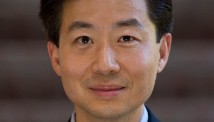 Sung-Yoon Lee
Sung-Yoon Lee Such a dramatic gesture of goodwill by the reclusive leader would achieve the effect of adding insult to the United States in light of North Korea's recent cancellation of an invitation to the U.S. special envoy on North Korean human rights issues.
Rodman, of course, is not qualified to carry out negotiations with North Korea on sensitive political issues. Nor does the North Korean leadership see him as a credible conveyor of official message to Washington.
Kim's unconventional courting of Rodman is about equivalent to his enjoyment of Disney characters and scantily clad women on stage. It's all jolly and trite pleasure.
Kim's attraction to American icons such as the NBA or Hollywood does not signal a genuine overture to Washington. It does not indicate intentions of reform or opening up of the isolated totalitarian state that imprisons some 1% of its population in political concentration camps.
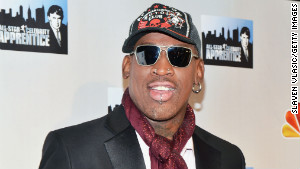 Dennis Rodman to see 'my friend Kim'
Dennis Rodman to see 'my friend Kim' We should never forget that amidst the levity and bonhomie that will emanate from Pyongyang in the coming days, North Korea, throughout more than 60 years of its existence, has committed systematic and widespread attacks on its civilian population, including murder, extermination, enslavement, torture, enforced sexual slavery and disappearance of people. In short, these are crimes against humanity.
But what about the residual effects of personal warmth and brotherhood between Kim and Rodman? Will not such a "cultural encounter" between the Korean and the American lead to a "breakthrough," as "ping-pong diplomacy" between China and the U.S. in 1971 supposedly did?
In 1971, American table tennis players were invited to China for the first time. Just three months after that unprecedented "cultural exchange," U.S. national security adviser Henry Kissinger secretly visited Beijing, a diplomatic coup that was capped off by President Richard Nixon's visit to China the following February.
Lest anyone think that ping-pong diplomacy and Sino-U.S. rapprochement are married by cause and effect and hastily draw the conclusion that Rodman's latest visit has a fighting chance of bringing about a diplomatic breakthrough between Washington and Pyongyang, I'd say: Theatrics are not equal to politics.
Kenneth Bae: Please help me
The goodwill triggered by ping-pong matches between Chinese and Americans in 1971 was a mood enhancer to the secret contacts between Washington and Beijing that had been underway since September 1970. The two countries wanted to discuss geopolitical issues of mutual concern: Containing the Soviet threat, the Vietnam War, China's seat in the U.N. Security Council and Taiwan.
But theatrics are not entirely irrelevant to politics. If anything, the young North Korean leader's occasional displays of affinity for American pop culture will only irk the country's revolutionary old guards. Kim clearly lacks the gravitas of his late father. He may believe that he is exuding an affable image by being seen with an American star. But by traditional Korean standards on how a national leader should carry himself, Kim comes across as less charismatic than -- dare I say -- a lightweight.
There is no reason to believe that the North Korean military would challenge anytime soon. Kim's hold on power over the party and the military seems, for now, firm. But the prospects for a long, happy reign for whom propagandists tout as a demigod are dim.
With time, Kim will come to believe in his own infallibility if not in his omnipotence. And megalomania is particularly susceptible to mortal miscalculation, whether on matters of court intrigue or foreign policy. In other words, for Marshal Kim Jong Un, fantasy is reality. And for a ruthless dictator, that's an invitation to an early brush with mortality.
If Dennis Rodman unwittingly sows the seeds of reality in the fantastical world of the North Korean leader by nudging him toward miscalculation and deeper depths of self-absorption or planting doubt in the minds of North Koreans with access to big guns -- then his latest courting of the Marshal may rightfully come to be remembered one day, indeed, as a game-changer.
Follow @CNNOpinion on Twitter.
Join us at Facebook/CNNOpinion.
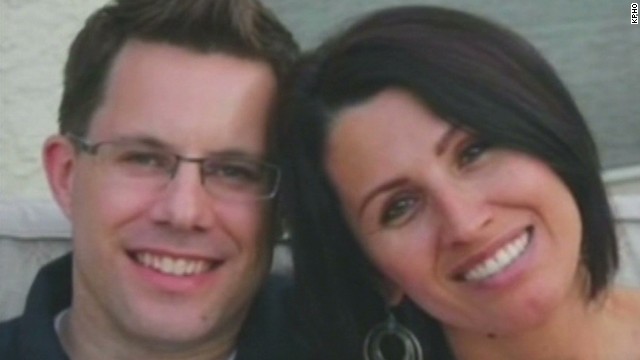 Mexican authorities arrested Yanira Maldonado, a U.S. citizen, right, on May 22, for alleged drug possession. She and her husband, Gary, were traveling from Mexico back to the United States when their bus was stopped and searched. She was released on Friday, May 31 and is back in the U.S.
Mexican authorities arrested Yanira Maldonado, a U.S. citizen, right, on May 22, for alleged drug possession. She and her husband, Gary, were traveling from Mexico back to the United States when their bus was stopped and searched. She was released on Friday, May 31 and is back in the U.S. 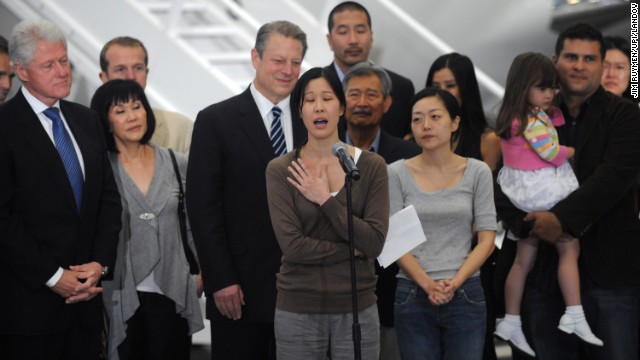 North Korea has arrested Americans before, only to release them after a visit by a prominent dignitary. Journalists Laura Ling, center, and Euna Lee, to her right, spent 140 days in captivity after being charged with illegal entry to conduct a smear campaign. They were freed in 2009 after a trip by former President Bill Clinton.
North Korea has arrested Americans before, only to release them after a visit by a prominent dignitary. Journalists Laura Ling, center, and Euna Lee, to her right, spent 140 days in captivity after being charged with illegal entry to conduct a smear campaign. They were freed in 2009 after a trip by former President Bill Clinton. 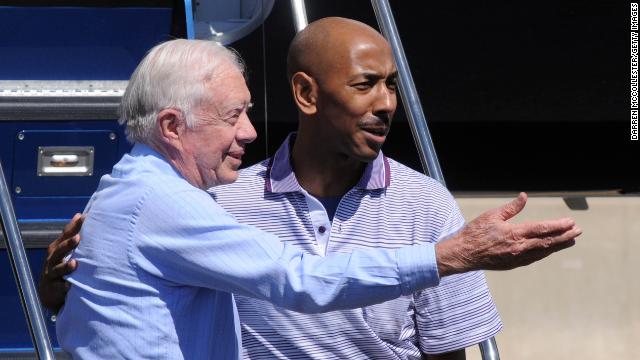 Former President Jimmy Carter negotiated the release of Aijalon Gomes, who was detained in 2010 after crossing into North Korea illegally from China. Analysts say high-level visits give Pyongyang a propaganda boost and a way to save face when it releases a prisoner.
Former President Jimmy Carter negotiated the release of Aijalon Gomes, who was detained in 2010 after crossing into North Korea illegally from China. Analysts say high-level visits give Pyongyang a propaganda boost and a way to save face when it releases a prisoner. 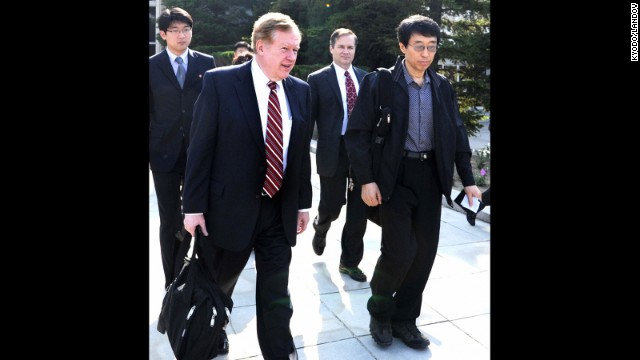 Eddie Yong Su Jun was released by North Korea a month after he was detained in April 2011. His alleged crime was not provided to the media. The American delegation that secured his freedom included Robert King, the U.S. special envoy for North Korean human rights issues.
Eddie Yong Su Jun was released by North Korea a month after he was detained in April 2011. His alleged crime was not provided to the media. The American delegation that secured his freedom included Robert King, the U.S. special envoy for North Korean human rights issues. 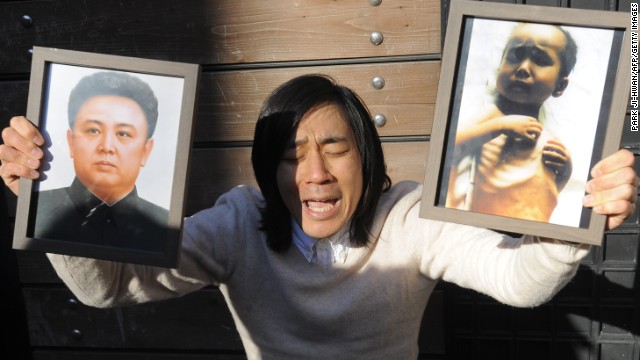 Robert Park was released by North Korea in 2010 without any apparent U.S. intervention. The Christian missionary crossed into North Korea from China, carrying a letter asking Kim Jong Il to free political prisoners and resign. North Korea's state-run news agency said Park was released after an "admission and sincere repentance of his wrongdoings." Here, Park holds a photo of Kim and a malnourished child during a protest in Seoul.
Robert Park was released by North Korea in 2010 without any apparent U.S. intervention. The Christian missionary crossed into North Korea from China, carrying a letter asking Kim Jong Il to free political prisoners and resign. North Korea's state-run news agency said Park was released after an "admission and sincere repentance of his wrongdoings." Here, Park holds a photo of Kim and a malnourished child during a protest in Seoul. 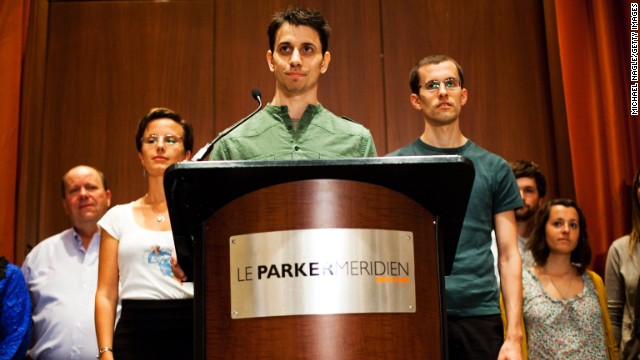 Josh Fattal, center, Shane Bauer and Sarah Shourd were detained by Iran while hiking near the Iraq-Iran border in July 2009. Iran charged them with illegal entry and espionage. Shourd was released on bail for medical reasons in September 2010; she never returned to face her charges. Bauer and Fattal were convicted in August 2011, but the next month they were released on bail and had their sentences commuted.
Josh Fattal, center, Shane Bauer and Sarah Shourd were detained by Iran while hiking near the Iraq-Iran border in July 2009. Iran charged them with illegal entry and espionage. Shourd was released on bail for medical reasons in September 2010; she never returned to face her charges. Bauer and Fattal were convicted in August 2011, but the next month they were released on bail and had their sentences commuted. 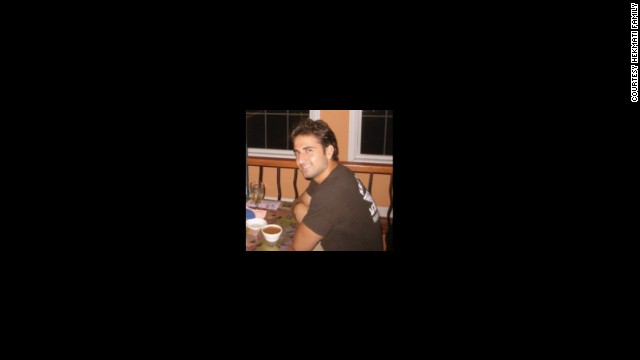 An Iranian court threw out a death penalty conviction last year for Amir Hekmati, a former U.S. Marine charged with spying. But he still remains in solitary confinement at Iran's notorious Evin Prison. Hekmati was detained in August 2011 during a visit to see his grandmother; his family and the Obama administration deny accusations that he was spying for the CIA.
An Iranian court threw out a death penalty conviction last year for Amir Hekmati, a former U.S. Marine charged with spying. But he still remains in solitary confinement at Iran's notorious Evin Prison. Hekmati was detained in August 2011 during a visit to see his grandmother; his family and the Obama administration deny accusations that he was spying for the CIA. 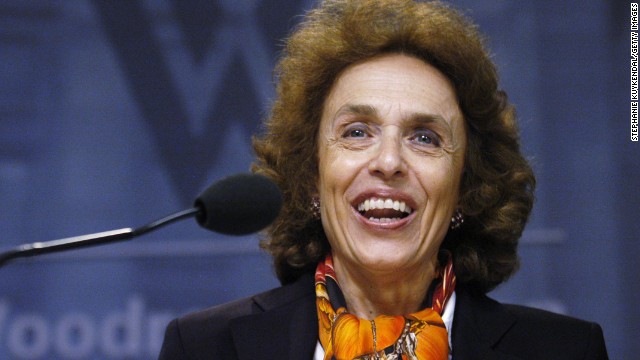 Haleh Esfandiari, an Iranian-American scholar, was also detained at Evin Prison, spending months in solitary confinement before Iran released her on bail in August 2007. Esfandiari was visiting her ailing mother in Tehran when she was arrested and charged with harming Iran's national security.
Haleh Esfandiari, an Iranian-American scholar, was also detained at Evin Prison, spending months in solitary confinement before Iran released her on bail in August 2007. Esfandiari was visiting her ailing mother in Tehran when she was arrested and charged with harming Iran's national security. 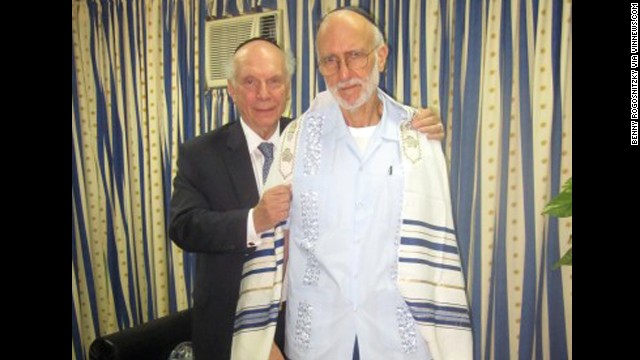 Alan Gross, at right with Rabbi Arthur Schneier, has been in Cuban custody since December 2009, when he was jailed while working as a subcontractor. Cuban authorities say Gross tried to set up illegal Internet connections on the island. Gross says he was just trying to help connect the Jewish community to the Internet. Former President Jimmy Carter and New Mexico Gov. Bill Richardson have both traveled to Cuba on Gross' behalf, but they were unable to secure his release.
Alan Gross, at right with Rabbi Arthur Schneier, has been in Cuban custody since December 2009, when he was jailed while working as a subcontractor. Cuban authorities say Gross tried to set up illegal Internet connections on the island. Gross says he was just trying to help connect the Jewish community to the Internet. Former President Jimmy Carter and New Mexico Gov. Bill Richardson have both traveled to Cuba on Gross' behalf, but they were unable to secure his release. 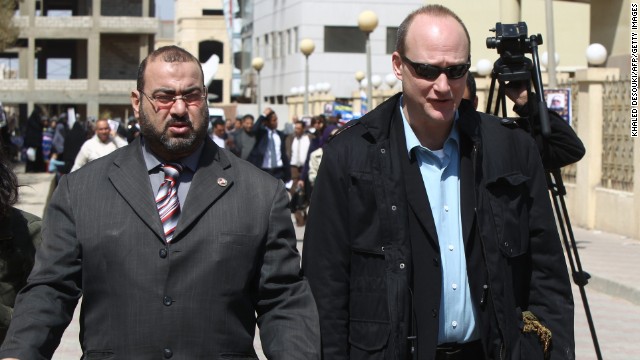 Sixteen Americans were among the dozens arrested in December 2011 when Egypt raided the offices of 10 nongovernmental organizations that it said received illegal foreign financing and were operating without a public license. Many of the employees posted bail and left the country after a travel ban was lifted a few months later. Robert Becker, right, chose to stay and stand trial.
Sixteen Americans were among the dozens arrested in December 2011 when Egypt raided the offices of 10 nongovernmental organizations that it said received illegal foreign financing and were operating without a public license. Many of the employees posted bail and left the country after a travel ban was lifted a few months later. Robert Becker, right, chose to stay and stand trial. 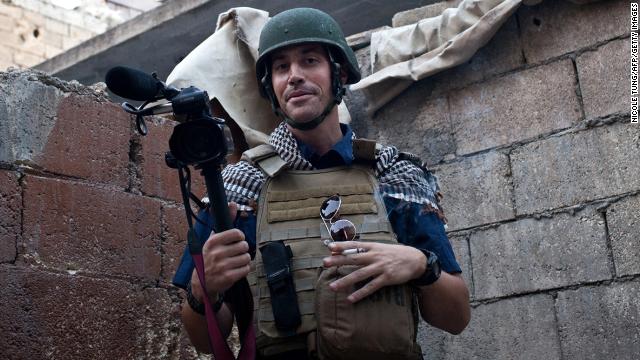 Freelance reporter James Foley went missing in November after his car was stopped by gunmen in Syria. He is likely being held by the Syrian government, according to the GlobalPost, an online international news outlet to which he contributed, and Foley's brother.
Freelance reporter James Foley went missing in November after his car was stopped by gunmen in Syria. He is likely being held by the Syrian government, according to the GlobalPost, an online international news outlet to which he contributed, and Foley's brother. 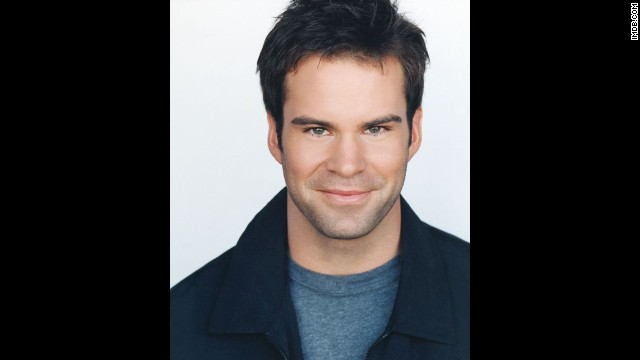 Filmmaker Timothy Tracy was arrested in Venezuela in April on allegations of funding opponents of newly elected President Nicolas Maduro, successor to the late Hugo Chavez. Tracy went to Venezuela to make a documentary about the political division gripping the country.
Filmmaker Timothy Tracy was arrested in Venezuela in April on allegations of funding opponents of newly elected President Nicolas Maduro, successor to the late Hugo Chavez. Tracy went to Venezuela to make a documentary about the political division gripping the country. 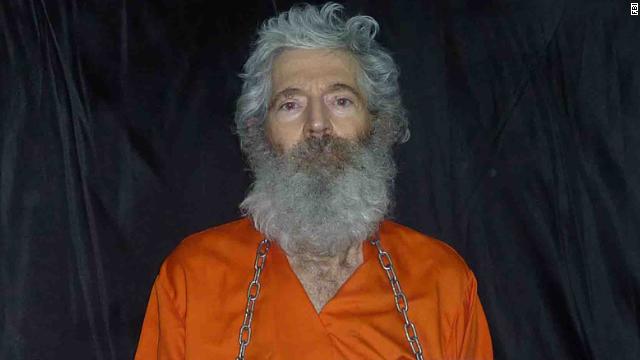 Retired FBI agent Robert Levinson has been missing since 2007. His family says he was working as a private investigator in Iran when he disappeared. It's believed Levinson, now 64, is being held captive somewhere in southwest Asia. Americans detained abroad Americans detained abroad Americans detained abroad Americans detained abroad Americans detained abroad Americans detained abroad Americans detained abroad Americans detained abroad Americans detained abroad Americans detained abroad Americans detained abroad Americans detained abroad Americans detained abroad Americans detained abroad HIDE CAPTION << <
Retired FBI agent Robert Levinson has been missing since 2007. His family says he was working as a private investigator in Iran when he disappeared. It's believed Levinson, now 64, is being held captive somewhere in southwest Asia. Americans detained abroad Americans detained abroad Americans detained abroad Americans detained abroad Americans detained abroad Americans detained abroad Americans detained abroad Americans detained abroad Americans detained abroad Americans detained abroad Americans detained abroad Americans detained abroad Americans detained abroad Americans detained abroad HIDE CAPTION << < 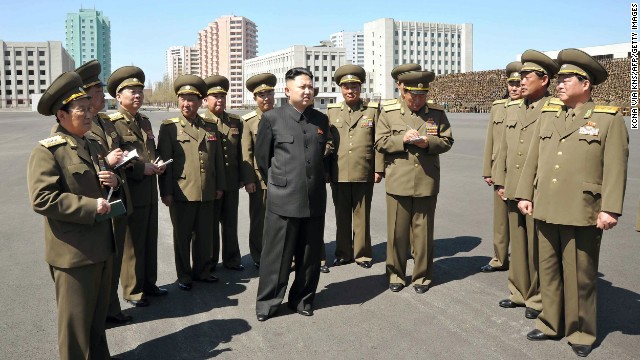 Kim Jong Un visits the Ministry of People's Security on Wednesday, May 1, as part of the country's May Day celebrations.
Kim Jong Un visits the Ministry of People's Security on Wednesday, May 1, as part of the country's May Day celebrations.  A North Korea soldier gestures to stop photographers from taking photos from a Chinese tour boat as other soldiers look on along the North Korean bank of the Yalu River near the town of Sinuiji across the Chinese city of Dandong in Liaoning province, China, on Saturday, April 6.
A North Korea soldier gestures to stop photographers from taking photos from a Chinese tour boat as other soldiers look on along the North Korean bank of the Yalu River near the town of Sinuiji across the Chinese city of Dandong in Liaoning province, China, on Saturday, April 6. 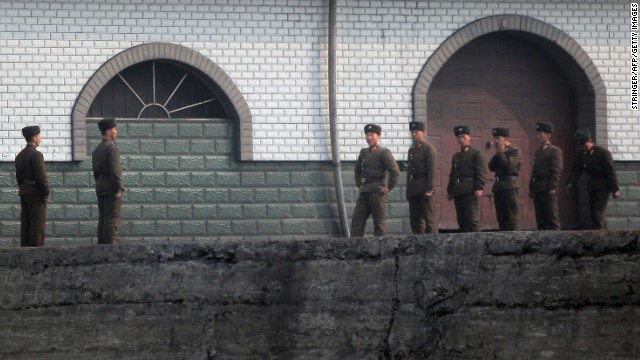 North Korean soldiers gather by the docks in Sinuiju near the Chinese border on Thursday, April 4.
North Korean soldiers gather by the docks in Sinuiju near the Chinese border on Thursday, April 4. 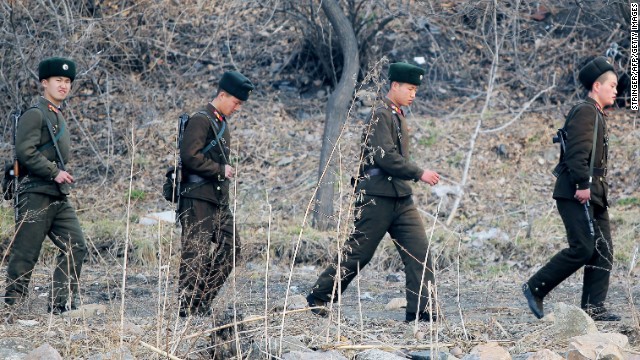 North Korean soldiers patrol along the Yalu River in Sinuiju across the border from the Chinese city of Dandong on April 4.
North Korean soldiers patrol along the Yalu River in Sinuiju across the border from the Chinese city of Dandong on April 4. 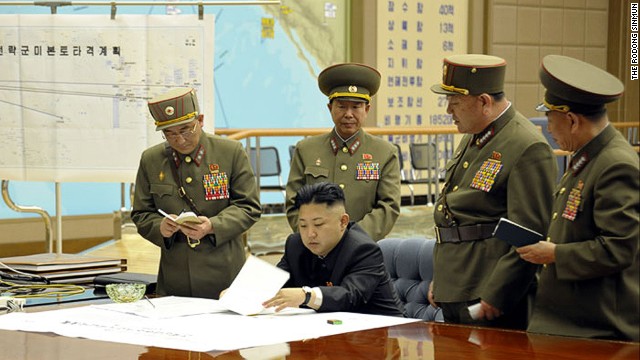 Kim Jong Un is briefed by his generals in this undated photo. On the wall is a map titled "Plan for the strategic forces to target mainland U.S."
Kim Jong Un is briefed by his generals in this undated photo. On the wall is a map titled "Plan for the strategic forces to target mainland U.S." 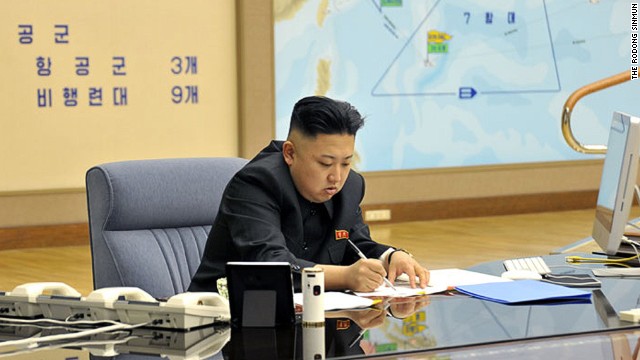 Kim Jong Un works during a briefing in this undated photo.
Kim Jong Un works during a briefing in this undated photo. 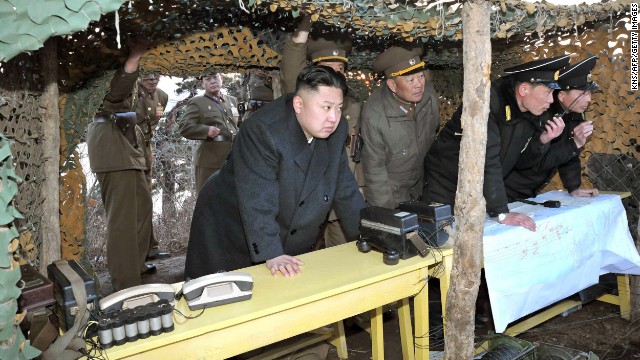 North Korean leader Kim Jong Un inspects drills by the Korean People's Army navy at an undisclosed location on North Korea's east coast on March 25 in a photo from the state-run Korean Central News Agency.
North Korean leader Kim Jong Un inspects drills by the Korean People's Army navy at an undisclosed location on North Korea's east coast on March 25 in a photo from the state-run Korean Central News Agency. 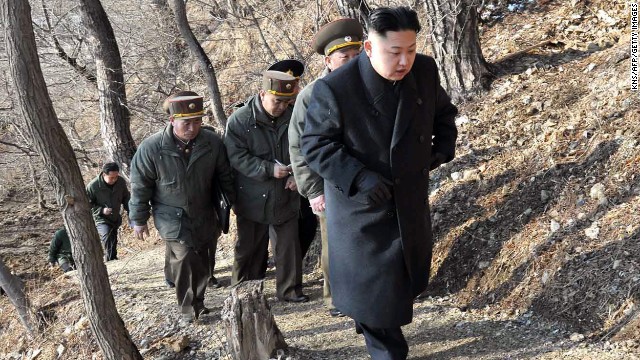 Kim makes his way to an observation post with North Korean soldiers on March 25.
Kim makes his way to an observation post with North Korean soldiers on March 25. 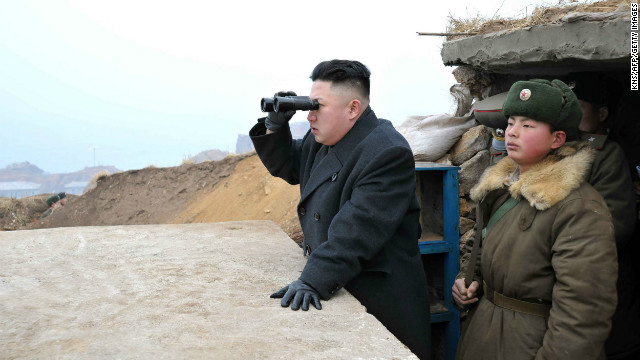 Kim uses a pair of binoculars to look south from the Jangjae Islet Defense Detachment near South Korea's Taeyonphyong Island on March 7.
Kim uses a pair of binoculars to look south from the Jangjae Islet Defense Detachment near South Korea's Taeyonphyong Island on March 7. 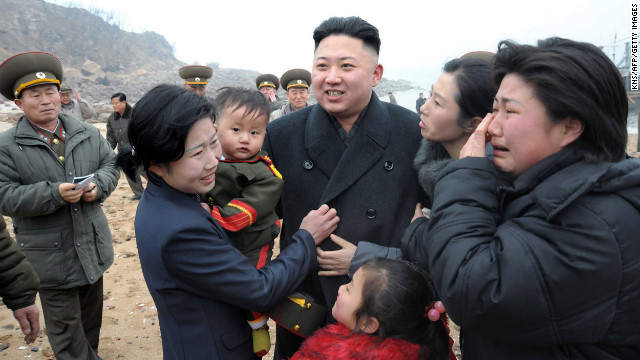 Kim is greeted by the family of a soldier as he inspects Jangjae Islet Defense Detachment near South Korea's Taeyonphyong Island in South Hwanghae province on Thursday, March 7, in a photo from the state-run Korean Central News Agency.
Kim is greeted by the family of a soldier as he inspects Jangjae Islet Defense Detachment near South Korea's Taeyonphyong Island in South Hwanghae province on Thursday, March 7, in a photo from the state-run Korean Central News Agency. 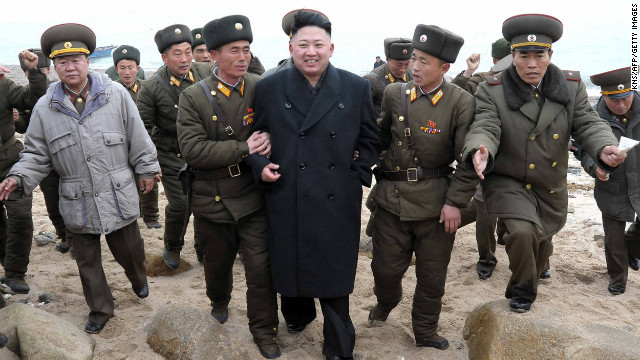 Kim is surrounded by soldiers during a visit to the Mu Islet Hero Defense Detachment near South Korea's Taeyonphyong Island on March 7. North Korea has escalated its bellicose rhetoric, threatening nuclear strikes, just before the U.N. Security Council passed tougher sanctions against the secretive nation on March 7.
Kim is surrounded by soldiers during a visit to the Mu Islet Hero Defense Detachment near South Korea's Taeyonphyong Island on March 7. North Korea has escalated its bellicose rhetoric, threatening nuclear strikes, just before the U.N. Security Council passed tougher sanctions against the secretive nation on March 7. 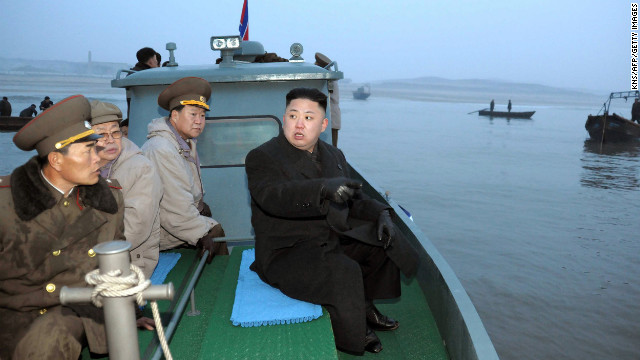 Kim arrives at Jangjae Islet by boat to meet with soldiers of the Jangjae Islet Defense Detachment near Taeyonphyong Island in South Hwanghae province on March 7.
Kim arrives at Jangjae Islet by boat to meet with soldiers of the Jangjae Islet Defense Detachment near Taeyonphyong Island in South Hwanghae province on March 7. 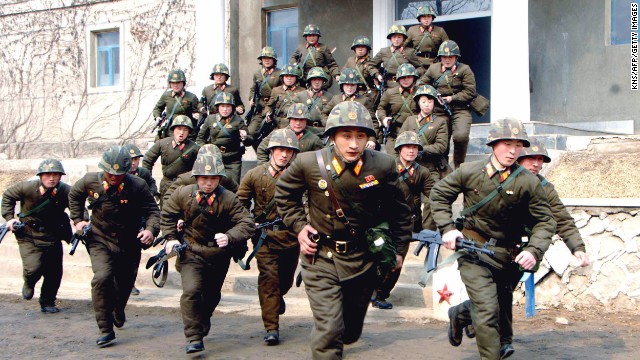 Soldiers in the North Korean army train at an undisclosed location on March 6.
Soldiers in the North Korean army train at an undisclosed location on March 6. 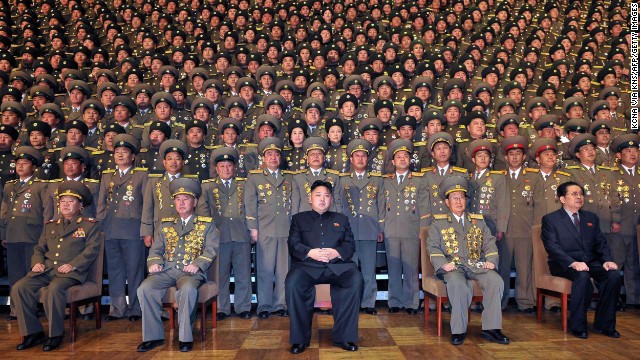 North Korean leader Kim Jong Un, center, poses with chiefs of branch social security stations in this undated picture released by North Korea's official news agency on November 27.
North Korean leader Kim Jong Un, center, poses with chiefs of branch social security stations in this undated picture released by North Korea's official news agency on November 27. 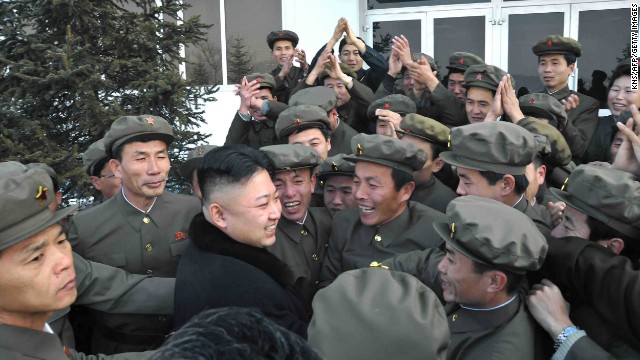 Kim celebrates with staff from the satellite control center in Pyongyang, North Korea, during the launch of a rocket carrying a satellite, in a photo released by the official North Korean news agency on December 12.
Kim celebrates with staff from the satellite control center in Pyongyang, North Korea, during the launch of a rocket carrying a satellite, in a photo released by the official North Korean news agency on December 12. 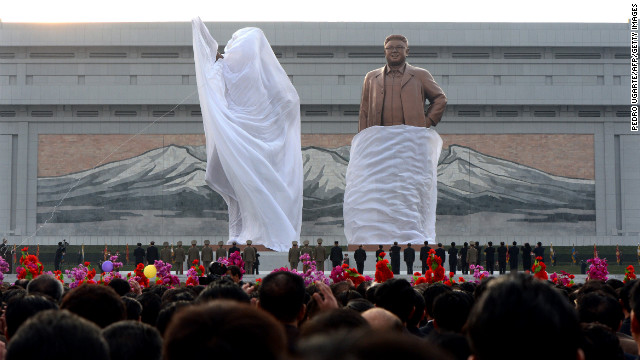 A crowd watches as statues of the nation's founder, Kim Il Sung, and his son Kim Jong Il are unveiled during a ceremony in Pyongyang on April 13, 2012. Photos from North Korea are rare, but the country was on full display in April 2012 as it celebrated the 100th birthday of Kim Il Sung.
A crowd watches as statues of the nation's founder, Kim Il Sung, and his son Kim Jong Il are unveiled during a ceremony in Pyongyang on April 13, 2012. Photos from North Korea are rare, but the country was on full display in April 2012 as it celebrated the 100th birthday of Kim Il Sung. 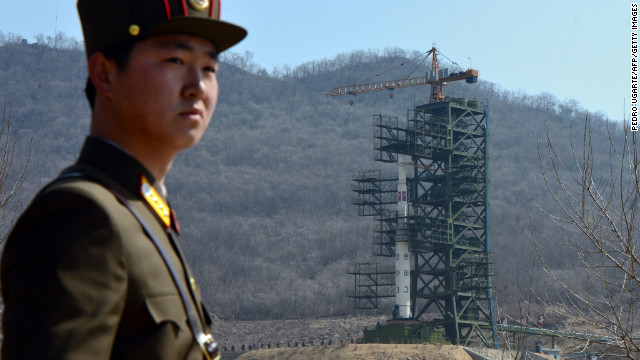 A North Korean soldier stands guard in front of an UNHA III rocket at the Tangachai-ri Space Center on April 8, 2012.
A North Korean soldier stands guard in front of an UNHA III rocket at the Tangachai-ri Space Center on April 8, 2012. 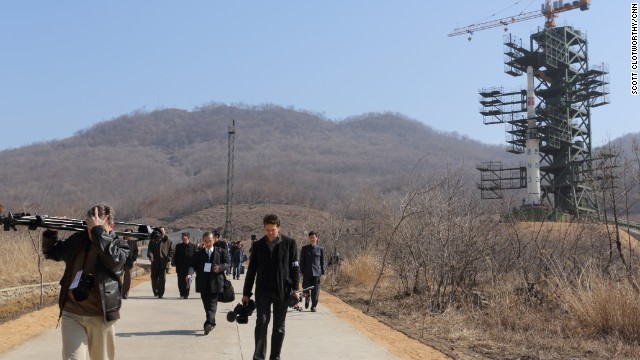 In April 2012, Pyongyang launched a long-range rocket, which broke apart and fell into the sea. The UNHA III rocket is pictured on its launch pad in Tang Chung Ri, North Korea.
In April 2012, Pyongyang launched a long-range rocket, which broke apart and fell into the sea. The UNHA III rocket is pictured on its launch pad in Tang Chung Ri, North Korea. 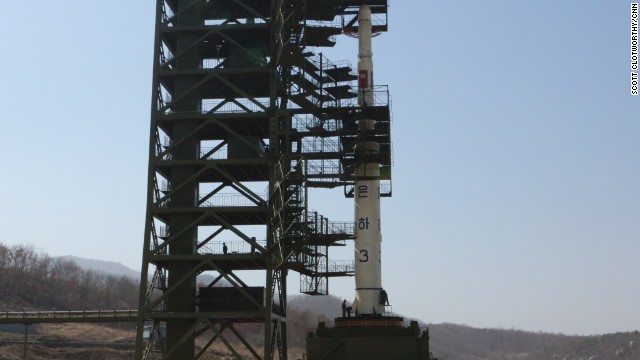 A closer look at the UNHA III rocket on its launch pad in Tang Chung Ri, North Korea.
A closer look at the UNHA III rocket on its launch pad in Tang Chung Ri, North Korea. 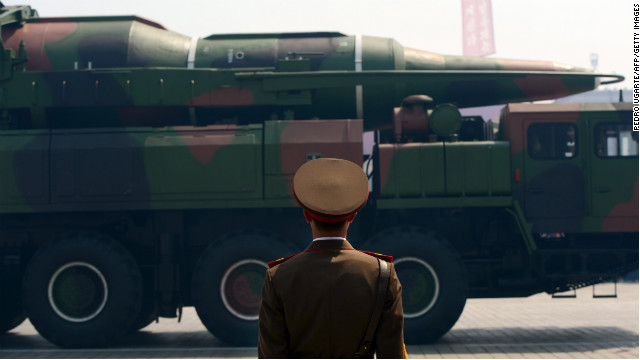 A military vehicle participates in a parade in Pyongyang on April 15, 2012.
A military vehicle participates in a parade in Pyongyang on April 15, 2012. 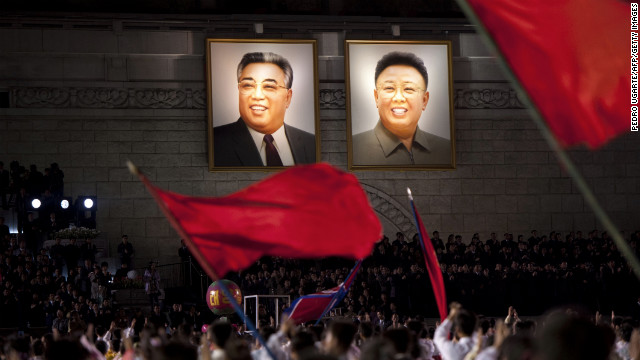 North Koreans wave flags in front of portraits of Kim Il Sung, left, and his son Kim Jong Il during celebrations to mark the 100th birth anniversary of Kim Il Sung in Pyongyang on April 16, 2012.
North Koreans wave flags in front of portraits of Kim Il Sung, left, and his son Kim Jong Il during celebrations to mark the 100th birth anniversary of Kim Il Sung in Pyongyang on April 16, 2012. 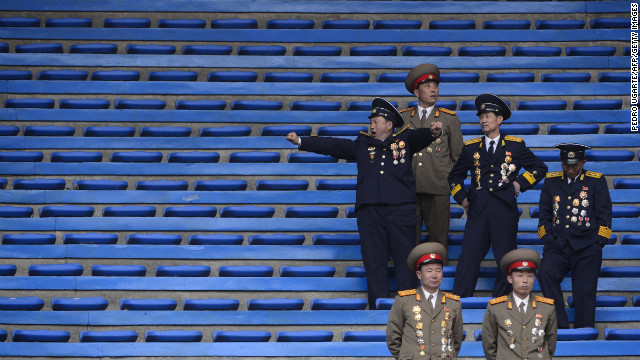 North Korean soldiers relax at the end of an official ceremony attended by leader Kim Jong Un at a stadium in Pyongyang on April 14, 2012.
North Korean soldiers relax at the end of an official ceremony attended by leader Kim Jong Un at a stadium in Pyongyang on April 14, 2012. 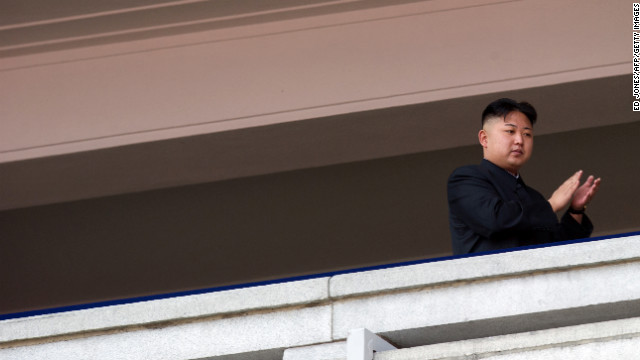 Kim Jong Un applauds as he watches a military parade in Pyongyang on April 15, 2012.
Kim Jong Un applauds as he watches a military parade in Pyongyang on April 15, 2012. 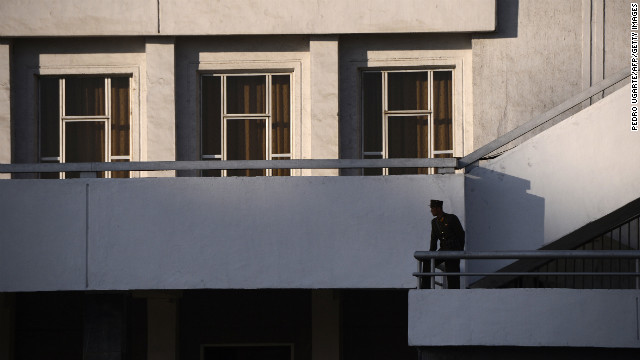 A North Korean soldier stands on a balcony in Pyongyang on April 16, 2012.
A North Korean soldier stands on a balcony in Pyongyang on April 16, 2012. 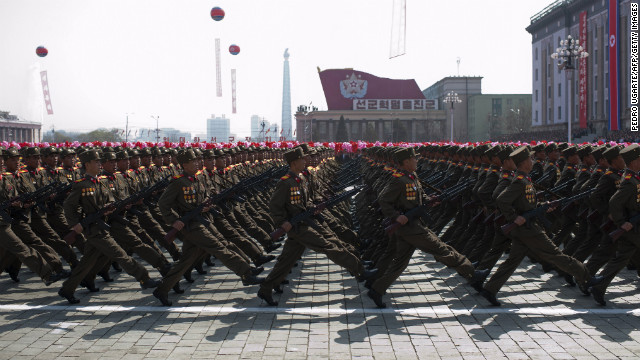 North Korean soldiers march during a military parade in Pyongyang on April 15, 2012.
North Korean soldiers march during a military parade in Pyongyang on April 15, 2012. 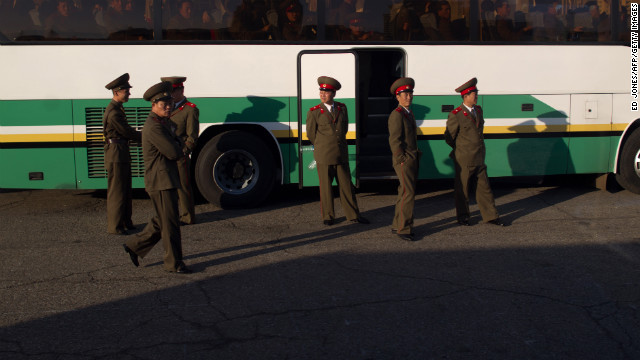 Soldiers board a bus outside a theater in Pyongyang on April 16, 2012.
Soldiers board a bus outside a theater in Pyongyang on April 16, 2012. 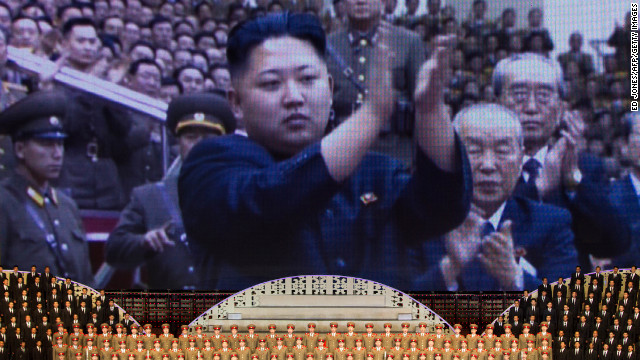 North Korean performers sit below a screen showing images of leader Kim Jong Un in Pyongyang on April 16, 2012.
North Korean performers sit below a screen showing images of leader Kim Jong Un in Pyongyang on April 16, 2012. 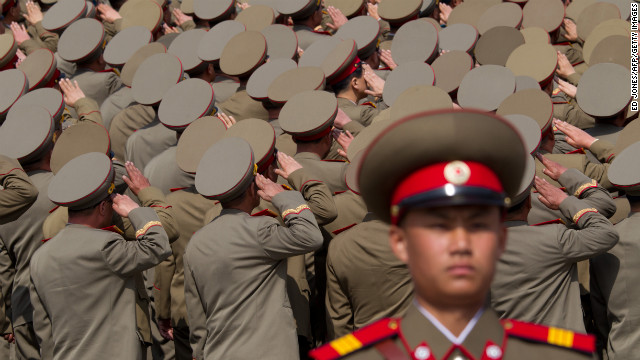 North Korean soldiers salute during a military parade in Pyongyang on April 15, 2012.
North Korean soldiers salute during a military parade in Pyongyang on April 15, 2012. 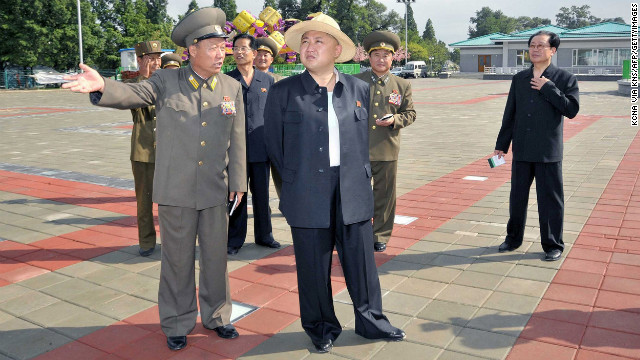 Kim Jong Un visits the Rungna People's Pleasure Ground, which is under construction in Pyongyang, in a photo released on July 3, 2012, by North Korea's official Korean Central News Agency.
Kim Jong Un visits the Rungna People's Pleasure Ground, which is under construction in Pyongyang, in a photo released on July 3, 2012, by North Korea's official Korean Central News Agency. 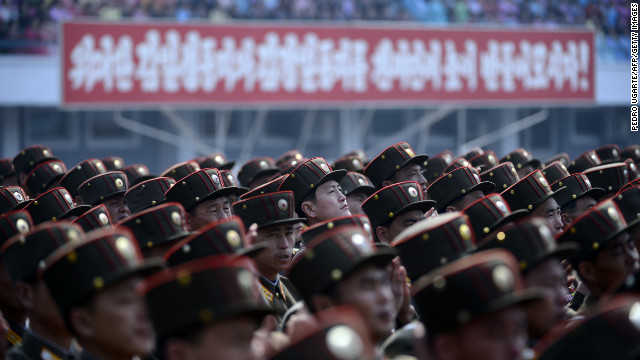 North Korean soldiers listen to a speech during an official ceremony attended by leader Kim Jong Un at a stadium in Pyongyang on April 14, 2012.
North Korean soldiers listen to a speech during an official ceremony attended by leader Kim Jong Un at a stadium in Pyongyang on April 14, 2012. 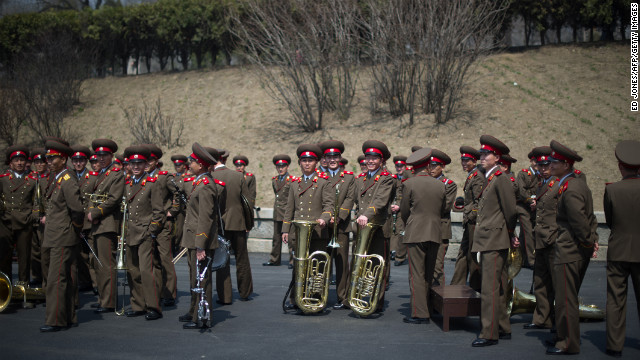 Members of a North Korean military band gather following an official ceremony at the Kim Il Sung stadium in Pyongyang on April 14, 2012.
Members of a North Korean military band gather following an official ceremony at the Kim Il Sung stadium in Pyongyang on April 14, 2012. 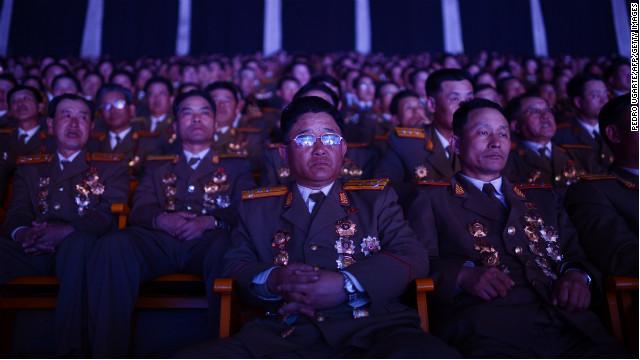 North Korean military personnel watch a performance in Pyongyang on April 16, 2012.
North Korean military personnel watch a performance in Pyongyang on April 16, 2012. 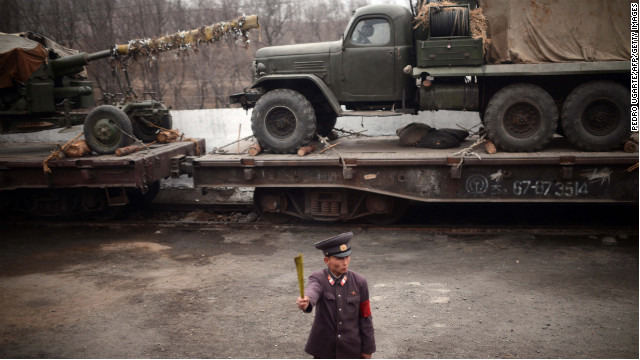 A North Korean controller is seen along the railway line between Pyongyang and North Pyongan province on April 8, 2012.
A North Korean controller is seen along the railway line between Pyongyang and North Pyongan province on April 8, 2012. 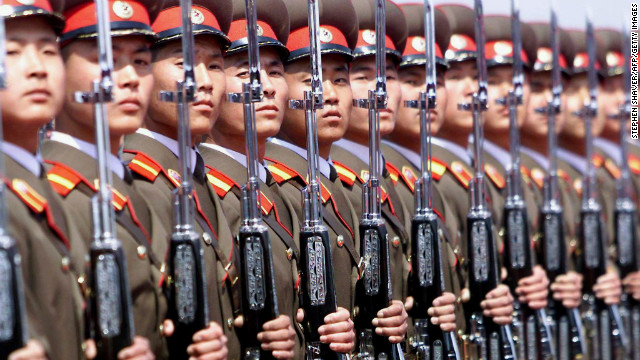 A North Korean military honor guard stands at attention at Pyongyang's airport during a diplomatic visit on May 2, 2001. Kim Jong Un and North Korea's military Kim Jong Un and North Korea's military Kim Jong Un and North Korea's military Kim Jong Un and North Korea's military Kim Jong Un and North Korea's military Kim Jong Un and North Korea's military Kim Jong Un and North Korea's military Kim Jong Un and North Korea's military Kim Jong Un and North Korea's military Kim Jong Un and North Korea's military Kim Jong Un and North Korea's military Kim Jong Un and North Korea's military Kim Jong Un and North Korea's military Kim Jong Un and North Korea's military Kim Jong Un and North Korea's military Kim Jong Un and North Korea's military Kim Jong Un and North Korea's military Kim Jong Un and North Korea's military Kim Jong Un and North Korea's military Kim Jong Un and North Korea's military Kim Jong Un and North Korea's military Kim Jong Un and North Korea's military Kim Jong Un and North Korea's military Kim Jong Un and North Korea's military Kim Jong Un and North Korea's military Kim Jong Un and North Korea's military Kim Jong Un and North Korea's military Kim Jong Un and North Korea's military Kim Jong Un and North Korea's military Kim Jong Un and North Korea's military Kim Jong Un and North Korea's military Kim Jong Un and North Korea's military Kim Jong Un and North Korea's military Kim Jong Un and North Korea's military Kim Jong Un and North Korea's military HIDE CAPTION << <
A North Korean military honor guard stands at attention at Pyongyang's airport during a diplomatic visit on May 2, 2001. Kim Jong Un and North Korea's military Kim Jong Un and North Korea's military Kim Jong Un and North Korea's military Kim Jong Un and North Korea's military Kim Jong Un and North Korea's military Kim Jong Un and North Korea's military Kim Jong Un and North Korea's military Kim Jong Un and North Korea's military Kim Jong Un and North Korea's military Kim Jong Un and North Korea's military Kim Jong Un and North Korea's military Kim Jong Un and North Korea's military Kim Jong Un and North Korea's military Kim Jong Un and North Korea's military Kim Jong Un and North Korea's military Kim Jong Un and North Korea's military Kim Jong Un and North Korea's military Kim Jong Un and North Korea's military Kim Jong Un and North Korea's military Kim Jong Un and North Korea's military Kim Jong Un and North Korea's military Kim Jong Un and North Korea's military Kim Jong Un and North Korea's military Kim Jong Un and North Korea's military Kim Jong Un and North Korea's military Kim Jong Un and North Korea's military Kim Jong Un and North Korea's military Kim Jong Un and North Korea's military Kim Jong Un and North Korea's military Kim Jong Un and North Korea's military Kim Jong Un and North Korea's military Kim Jong Un and North Korea's military Kim Jong Un and North Korea's military Kim Jong Un and North Korea's military Kim Jong Un and North Korea's military HIDE CAPTION << <
{ 0 comments... read them below or add one }
Post a Comment